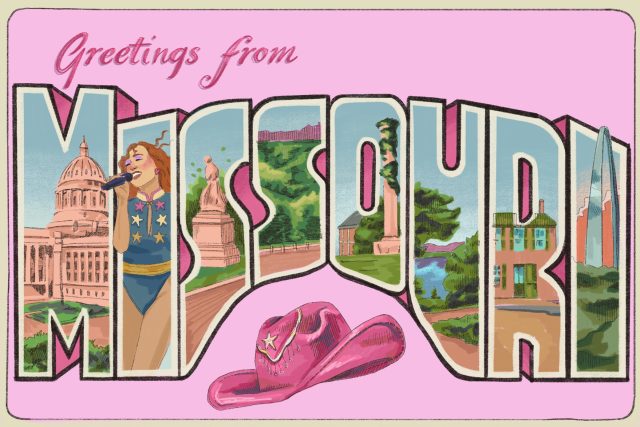[ad_1]
Since the release of “The Rise and Fall of a Midwest Princess,” Chappell Roan soared into the public spotlight. The Missouri native captivated audiences with her explicit lyrics and flashy wardrobe, earning a cult following overnight. However, what seemed like a sudden success was actually a project years in the making.
Born in the small, conservative town of Willard, Mo., Roan grew up in a heavily Christian household, attending church three times per week. In an interview with Rolling Stone, she recalled feeling “so out of place in (her) hometown.” At 17, Roan signed with Atlantic Records after posting on YouTube. She flew back and forth between Missouri and Los Angeles, releasing the single “Good Hurt” followed by the EP “School Nights.”
This era of Roan’s music is a far cry from the exuberance of “The Rise and Fall of a Midwest Princess,” characterized by a gloomier, more serious aesthetic. Songs like “Good Hurt” and “School Nights” describe the thrill of loving a bad boy, solidifying the darker tone with lyrics like “all I really want is a good hurt.”
Despite her musical aesthetic, Roan says her time in L.A. introduced her to the extravagance she is now known for. In an interview with NME, Roan discussed the culture shock she experienced when first arriving in the city, saying she’d “never even seen a drag queen before.” Being exposed to Queer culture was a turning point in Roan’s life, conveyed in “Pink Pony Club,” originally released as a single under Atlantic Records. The song tells the story of a Tennessee girl moving to California to become a go-go dancer, much to the dismay of her scandalized mother. Although “Pink Pony Club” doesn’t overtly discuss Roan’s sexuality, the story of leaving small-town life for the big city is a relatable experience for many LGBTQ+ youth. Although the song wasn’t an instant hit, it marks Chappell Roan’s shift to the artist that fans know and love today.
Alongside her music, Roan embraces her Queer identity through her fashion, often incorporating drag aesthetics into her looks. At her Kentuckiana Pride performance this past June, she took inspiration from famous drag queen Divine, sporting a red gown with a leopard print bra peaking out. Roan’s fashion has become a staple of her brand, with fans always excited to see what she wears at her next performance.
Even with her newfound freedom in L.A., Roan still missed her life in Missouri. In “California,” her final song with Atlantic Records, Roan discusses her struggles adjusting to her new life and her desire to return home to her “dying town” in Missouri. Her homesickness comes from trading the “amber-clay roads” of Willard for the “sea foam and the endless sun rays” of L.A. Shortly after releasing the song, she was dropped from her label and returned to her hometown, working various jobs while still trying to make it as an independent artist. Her 2022 release “Naked In Manhattan” was both her first song as an independent artist and her first song to explicitly discuss her Queerness.
Chappell Roan’s rise to stardom was filled with ups, downs and a roller coaster ride of self-discovery. “The Rise and Fall of a Midwest Princess” is the culmination of years of dedication, with the history behind each track apparent. The album incorporates songs from Roan’s early career, including “Pink Pony Club” and “California,” alongside songs released independently like “Naked In Manhattan” and “Casual.” While she swapped her gloomy aesthetic for a much bolder, brighter one, Roan continues to stay true to her Missouri roots.
On her “Midwest Princess Tour,” Roan has set various themes for her shows, each based on songs from “The Rise and Fall of a Midwest Princess.” One such theme is Midwest Princess, marrying Roan’s midwestern roots with the campy, colorful aesthetic she’s now known for. Adorned in camouflage and sparkles, she pays homage to her Missouri heritage. The theme showcases Roan’s appreciation for her home state with her own twist. Her ability to merge her upbringing with her current aesthetic has created an image that is fun and bold, but still highly relatable.
Through her vibrant music and on-stage persona, Chappell Roan has resonated with many Queer youth, especially in the midwest. Feeling out of place in your hometown is an experience many can relate to, which Roan’s music encapsulates perfectly. The popularity of songs like “Red Wine Supernova” and “Good Luck, Babe!” has brought Queerness into the spotlight, providing young Queer people with representation and reassurance. Roan has also been highly outspoken about LGBTQ+ rights and invites local drag artists to open for her shows.
Chappell Roan’s success has made a remarkable impact not only on music but on the LGBTQ+ community. As her fan base grows, her impact grows with it, and I can’t wait to see where she goes next.
Daily Arts Writer Morgan Sieradski can be reached at kmsier@umich.edu.
Related articles
[ad_2]
Source link











